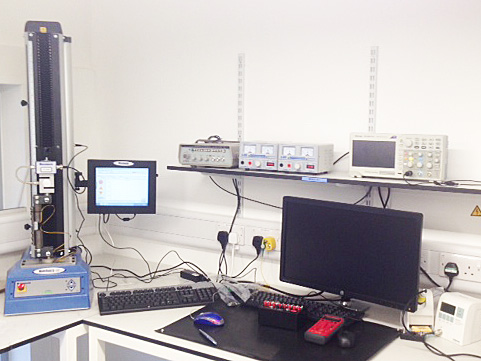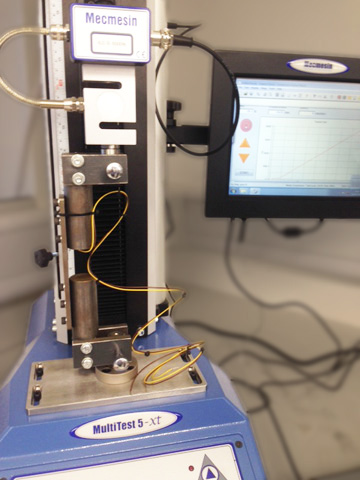
The MultiTest has a small footprint and is easily housed in the Bioengineering laboratory |
The Department of Bioengineering at Imperial College London was a pioneering organisation in the formulation of this discipline and today is the leading establishment of its kind in the UK. It combines industry partnerships, to develop new technologies, with diverse research activities and both undergraduate and postgraduate degree courses. The specialised nature of the field poses unique challenges, through its cross-disciplinary activities in biomedical sciences, clinical practice and pure engineering. Experience of the practical aspects of this rapidly-evolving sphere is an essential foundation for students graduating from this world-renowned institution. The department required testing equipment for its own lab, for training in solid mechanics, and which could also be used with pre-existing, custom-made testing rigs.

Bone repair plate: strain-gauges record compression and flexure deformation data |
Mecmesin supplied a touch screen controlled UTM with fixtures and a 5 kN loadcell, rated to accommodate the expected force values in the range of tests on mild steel specimens. The touch screen operation was ideal for the educational environment, where specific test procedures are programmed and then run by selecting an icon. The emphasis is on learning from the test results rather than the programming, and the MultiTest xt, though controlled by powerful Emperor™ software, requires minimal training to operate. New programs can be added to the library as required, providing the flexibility to adapt to an expanding curriculum. The system enables results and calculations to be displayed immediately alongside the graph, indicating important features of the load-displacement curve. The data are output for further calculation and comparison of the mechanical properties of the test samples – Young’s Modulus, ultimate tensile strength and yield stress. Dog-bone specimens provide repeatable and controllable deformation behaviour in the tensile tests, to demonstrate fundamental engineering theory. The versatile test stand is also able to perform compression procedures applicable to the real world applications of biomechanical components – e.g. prosthetics, broken bones – where bending and compression forces are experienced, or a complex physical design with holes or cut-outs which may induce stress concentrations. The department uses strain gauges to return the data for material property calculations, for a complete analysis capability.
“The Bioengineering Department at Imperial required a new system for teaching purposes to demonstrate tensile and compressive testing on a range of different materials and custom fixtures. A system was needed that was flexible and easy to use but with a compact form that would fit our available space. The MultiTest 5-xt was an ideal solution and the hardware support from Mecmesin has been excellent.”
Dr. Dominic Southgate, Senior Teaching Fellow, School of Design Engineering